|
Books Should Be Free Loyal Books Free Public Domain Audiobooks & eBook Downloads |
|
|
Books Should Be Free Loyal Books Free Public Domain Audiobooks & eBook Downloads |
|
Science |
|---|
|
Book type:
Sort by:
View by:
|
By: Harry Harrison (b. 1925) | |
|---|---|
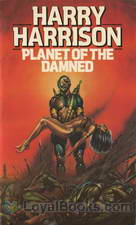 Planet of the Damned
Planet of the Damned
Once in a generation, a man is born with a heightened sense of empathy. Brion Brandd used this gift to win the Twenties, an annual physical and mental competition among the best and smartest people on Anvhar. But scarcely able to enjoy his victory, Brandd is swept off to the hellish planet Dis where he must use his heightened sense of empathy to help avert a global nuclear holocaust by negotiating with the blockading fleet, traversing the Disan underworld, and cracking the mystery of the savagely ruthless magter. Summary by Great Plains. | |
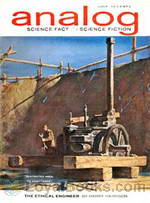 The Ethical Engineer
The Ethical Engineer
The Ethical Engineer also known as Deathworld II finds our hero Jason dinAlt captured to face justice for his crimes, but the ever-wily gambler crashes his transport on a primitive planet populated by clans that hoard knowledge. It’s a difficult situation for a guy who just wants to get back to Pyrrus. – The Ethical Engineer was first published in the July and August 1963 issues of Analog Science Fact & Fiction. | |
 The Misplaced Battleship
The Misplaced Battleship
"It might seem a little careless to lose track of something as big as a battleship ... but interstellar space is on a different scale of magnitude. But a misplaced battleship—in the wrong hands!—can be most dangerous." The world class con man and thief known as the Stainless Steel Rat (diGriz) has another very big problem to solve and this science fiction novella by the great Harry Harrison will see if he can solve it and perhaps four or five more like it before this fascinating and funny tale is finished. 'Use a thief to catch a thief' sounds great but it sometimes has unexpected results. | |
 Arm of the Law
Arm of the Law
A quiet backwater outpost on Mars gets a surprise in the form of a new police recruit - in a box! Yep, it's a prototype robot cop sent to the backwater station for testing. And Harrison tells the strange, funny and scary things that begin to happen after that, as only he can. | |
 The K-Factor
The K-Factor
The human race has reached the stars, colonized many planets and done amazing things in all areas of scientific progress. But humans are still humans and remain both honorable and not so honorable; some with high ideals and others with very low ones indeed. So why hasn't war occurred in several centuries among the hundreds of planets? Has man really changed? Not on your life it hasn't! Read how science has given man peace but at what cost? | |
 The Repairman
The Repairman
This is a collection of 3 of Harry Harrison marvelous early stories that were published in Galaxy, Analog and Fantastic Universe. The Repairman (1958) is a straight fun SF story of a man getting a job done. It is most typical of his later style in series like the Stainless Steel Rat; Toy Shop (1962), a short piece exploring bureaucratic blindness and one ingenious way around it and The Velvet Glove (1956), my favorite for its writing style, fun perspective, sly social commentary on the scene in 1956 and just plain delightful imagination. And he manages to pack excitement and mystery in at the same time. | |
 Toy Shop
Toy Shop
| |
 Navy Day
Navy Day
| |
 The Velvet Glove
The Velvet Glove
| |
By: Harry La Tourette Foster (1894-1932) | |
|---|---|
 Gringo In Mañana-Land
Gringo In Mañana-Land
Foster was a World War I veteran, world wanderer, journalist, embassy attaché, stoker on ships, miner, stowaway, bandit’s prisoner in Mexico, who wrote of Latin America and the Orient. He died an early death of pneumonia at his mother’s house in New York state. This 1924 book is a prime example of his witty travel writing and close observation. The New York Times reported that in 1919 he started travelling and for some ten years he seldom remained in one place. | |
By: Harry Rimmer (1890-1952) | |
|---|---|
 Dead Men Tell Tales
Dead Men Tell Tales
"Dead men tell no tales" was a common adage before the days of forensic science. In this book, the well-known evangelist and scientist uses Egyptology and archaeology to counter the argument in the investigation of Bible lore.. - Summary by Lynne Thompson | |
By: Harry Stephen Keeler (1890-1967) | |
|---|---|
 John Jones's Dollar
John Jones's Dollar
| |
By: Harvey Newcomb (1803-1863) | |
|---|---|
 A Practical Directory for Young Christian Females Being a Series of Letters from a Brother to a Younger Sister
A Practical Directory for Young Christian Females Being a Series of Letters from a Brother to a Younger Sister
| |
By: Havelock Ellis (1859-1939) | |
|---|---|
 Studies in the Psychology of Sex, Volume One
Studies in the Psychology of Sex, Volume One
The first of six volumes, this volume covers in extensive detail the topics of "The Evolution of Modesty", "The Phenomena of Sexual Periodicity", and "Auto-Eroticism". Written as an anthropological and psychological study from the point of view of Havelock, the famous British sexologist of the late 19th century, who was also a physician and social reformer. | |
 Essays in War-Time Further Studies in the Task of Social Hygiene
Essays in War-Time Further Studies in the Task of Social Hygiene
| |
 The Task of Social Hygiene
The Task of Social Hygiene
| |
 Study of British Genius
Study of British Genius
The psychological and anthropological character of genius in the British Isles was investigated by Ellis. Citing and collating an extensive source of information from the Dictionary of National Biography, many pieces of informational are discussed, including the ancestral heritage, geographical distribution, professions, and health and morbidity of the most the most preeminent men and women of the time. This work also promotes his theory that large cities are not only counterproductive to the development of high achievers, but detrimental to national health. | |
By: Hector Macpherson (1888-1956) | |
|---|---|
 Romance of Modern Astronomy
Romance of Modern Astronomy
From the series, The Library of Romance, the reader is introduced in this book to the modern astronomy of 1911. The author discusses our solar system, including the planets known at that time, comets, the stars, the origins of the universe, and a few famous astronomers. | |
By: Helen Campbell (1839-1918) | |
|---|---|
 Women Wage-Earners Their Past, Their Present, and Their Future
Women Wage-Earners Their Past, Their Present, and Their Future
| |
 Prisoners of Poverty Abroad
Prisoners of Poverty Abroad
| |
By: Helen Follett Jameson (1873-) | |
|---|---|
 The Woman Beautiful or, The Art of Beauty Culture
The Woman Beautiful or, The Art of Beauty Culture
| |
By: Helen Huber | |
|---|---|
 I'll Kill You Tomorrow
I'll Kill You Tomorrow
| |
By: Helen Keller (1888-1968) | |
|---|---|
 The Story of My Life
The Story of My Life
An autobiography of Helen Keller published when the author was still in her early 20's. The narrative reveals how her mind developed and matured until she began her studies at Radcliffe College | |
 The World I Live In
The World I Live In
The World I Live In by Helen Keller is a collection of essays that poignantly tells of her impressions of the world, through her sense of touch, smell, her imagination and dreams. My hand is to me what your hearing and sight together are to you. In large measure we travel the same highways, read the same books, speak the same language, yet our experiences are different. All my comings and goings turn on the hand as on a pivot. It is the hand that binds me to the world of men and women. The hand is my feeler with which I reach through isolation and darkness and seize every pleasure, every activity that my fingers encounter... | |
By: Helen M. Urban | |
|---|---|
 The Glory of Ippling
The Glory of Ippling
| |
By: Helena Swanwick (1864-1939) | |
|---|---|
 Future of the Women's Movement
Future of the Women's Movement
"There may seem to be a disappointing lack of prophesy in a book avowedly dealing with the future; but since I believe the women’s movement to be a seeking for knowledge and good, to show what is reasonable and good in the movement is to show what will persist and triumph. Through all our faults and mistakes, we women are aiming at better understanding and co-operation with men, and a better adaptation to one another of conditions and persons. We are having to hammer out for ourselves the right principles of government... | |
By: Hendrik A. Lorentz (1853-1928) | |
|---|---|
 Einstein Theory of Relativity
Einstein Theory of Relativity
When Albert Einstein published his first paper on relativity theory, it caused a stir in the physicists' community. When more and more evidence was gathered to prove the theory correct, even laymen became interested in it. Since the theory of relativity uses involved higher mathematics, it is considered notoriously difficult to grasp, and at the time it was published, it was claimed that only 12 people in the world were able to fully understand it. One of these was the Dutch physicist Hendrik Lorentz, who wrote the articles collected in this book for a lay audience... | |
By: Henny Kindermann | |
|---|---|
 Lola or, The Thought and Speech of Animals
Lola or, The Thought and Speech of Animals
| |
By: Henri Poincaré (1854-1912) | |
|---|---|
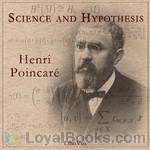 Science and Hypothesis
Science and Hypothesis
Jules Henri Poincaré (1854–1912) was one of France’s greatest mathematicians and theoretical physicists, and a philosopher of science. As a mathematician and physicist, he made many original fundamental contributions to pure and applied mathematics, mathematical physics, and celestial mechanics. He was responsible for formulating the Poincaré conjecture, one of the most famous problems in mathematics. In his research on the three-body problem, Poincaré became the first person to discover a chaotic deterministic system which laid the foundations of modern chaos theory... | |
By: Henry A. (Henry Augustus) Mott (1852-1896) | |
|---|---|
 Was Man Created?
Was Man Created?
| |
By: Henry Brodribb Irving (1870-1919) | |
|---|---|
 A Book of Remarkable Criminals
A Book of Remarkable Criminals
| |
By: Henry David Thoreau (1817-1862) | |
|---|---|
 Walden
Walden
Two years, two months and two days! This is what forms the time line of one man's quest for the simple life and a unique social experiment in complete self reliance and independence. Henry David Thoreau published Walden in 1884. Originally drafted as a series of essays describing a most significant episode in his life, it was finally released in book form with each essay taking on the form of a separate chapter. Thoreau's parents were in financial straights, but rich intellectually and culturally... | |
By: Henry Ebenezer Handerson | |
|---|---|
 Gilbertus Anglicus Medicine of the Thirteenth Century
Gilbertus Anglicus Medicine of the Thirteenth Century
| |
By: Henry Edward Crampton (1875-) | |
|---|---|
 The Doctrine of Evolution Its Basis and Its Scope
The Doctrine of Evolution Its Basis and Its Scope
| |
By: Henry Ernest Dudeney | |
|---|---|
 Amusements in Mathematics
Amusements in Mathematics
AMUSEMENTS IN MATHEMATICSby HENRY ERNEST DUDENEYPREFACEIn issuing this volume of my Mathematical Puzzles, of which some have appeared in periodicals and others are given here for the first time, I must acknowledge the encouragement that I have received from many unknown correspondents, at home and abroad, who have expressed a desire to have the problems in a collected form, with some of the solutions given at greater length than is possible in magazines and newspapers. Though I have included a few old puzzles that have interested the world for generations, where I felt that there was something new to be said about them, the problems are in the main original... | |
By: Henry Faudel | |
|---|---|
 Suggestions to the Jews for improvement in reference to their charities, education, and general government
Suggestions to the Jews for improvement in reference to their charities, education, and general government
| |
By: Henry Fielding (1707-1754) | |
|---|---|
 Enquiry Into The Causes Of The Late Increase Of Robbers
Enquiry Into The Causes Of The Late Increase Of Robbers
Early eighteenth century England saw the criminal element bargaining with magistrates and lawyers to be released or receive lenient sentences. Neither party could be trusted and the situation grew worse. Enter famed author Henry Fielding, who had a strong social conscience and served as a magistrate. In addition to this treatise, he began a register of convicted criminals, and recruited six full-time, paid constables - known colloquially as "The Bow Street Runners" and hailed as the forerunners of the modern police force. | |
By: Henry Gray | |
|---|---|
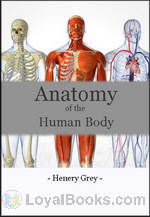 Anatomy of the Human Body
Anatomy of the Human Body
Henry Gray’s classic anatomy textbook was first published in 1858 and has been in continuous publication ever since, revised and expanded through many successive editions. This recording is of the public-domain 1918 US edition (some information may be outdated). | |
By: Henry Harris Jessup (1832-1910) | |
|---|---|
 The Women of the Arabs
The Women of the Arabs
| |
By: Henry Hasse (1913-1977) | |
|---|---|
 We're Friends, Now
We're Friends, Now
| |
 Walls of Acid
Walls of Acid
| |
By: Henry Josephs | |
|---|---|
 The Fourth Invasion
The Fourth Invasion
| |
By: Henry Julius Wetenhall Tillyard (1881-1968) | |
|---|---|
 Greek Literature
Greek Literature
"The Greeks were the most intellectual people of the old world. … The study of Greek literature is therefore a proper element in a liberal education. The Greek language, naturally flexible and rich in poetical words, becomes in the hands of the great writers a medium of unequalled force, clearness, and adaptability, able to express as well the highest aspirations of the poet as the subtlest shades of philosophical argument or the most abstruse technicalities. The books of Greece have passed the critical selection of the ages, and the student, unencumbered by masses of inferior material, can approach the works of acknowledged masters, the true fountain-head of European culture... | |
By: Henry L. Mencken (1880-1956) | |
|---|---|
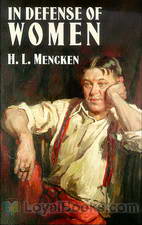 In Defense of Women
In Defense of Women
In Defense of Women is H. L. Mencken’s 1918 book on women and the relationship between the sexes. Some laud the book as progressive while others brand it as reactionary. While Mencken didn’t champion women’s rights, he described women as wiser in many novel and observable ways, while demeaning average men. According to Mencken’s biographer, Fred Hobson: Depending on the position of the reader, he was either a great defender of women’s rights or, as a critic labelled him in 1916, ‘the greatest misogynist since Schopenhauer’,'the country’s high-priest of woman-haters.’ | |
By: Henry Lindlahr (1862-1924) | |
|---|---|
 Nature Cure
Nature Cure
| |
By: Henry Lovejoy Ambler (1843-1924) | |
|---|---|
 Tin Foil and Its Combinations for Filling Teeth
Tin Foil and Its Combinations for Filling Teeth
| |
By: Henry M. Field (1822-1907) | |
|---|---|
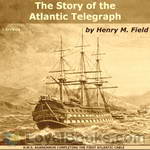 The Story of the Atlantic Telegraph
The Story of the Atlantic Telegraph
Cyrus W. Field had a dream: to link the Old World of Britain and Europe to that of the New World of North America by a telegraph cable stretching across the great Atlantic Ocean. It took him thirteen years, a lot of money, and many men and ships and cable to make it happen. He wanted to bring the world together and make it a smaller place; to forge alliances and achieve peace. This is his story. (Introduction by Alex C. Telander) | |
By: Henry Mayhew (1812-1887) | |
|---|---|
 London Labour and the London Poor Volume III
London Labour and the London Poor Volume III
Subtitled, "A Cyclopaedia of the condition and earnings of those that will work, those that cannot work, and those that will not work." "The history of a people from the lips of the people themselves .. their labour, earnings, trials and sufferings, in their own unvarnished language, and to portray the condition of their homes and their families by personal observation of the places ..." "My earnest hope is that the book may serve to give the rich a more intimate knowledge of the sufferings, and the frequent heroism under those sufferings, of the poor ... | |
 London Labour and the London Poor Volume II
London Labour and the London Poor Volume II
Subtitled, "A Cyclopaedia of the condition and earnings of those that will work, those that cannot work, and those that will not work." "The history of a people from the lips of the people themselves .. their labour, earnings, trials and sufferings, in their own unvarnished language, and to pourtray the condition of their homes and their families by personal observation of the places ..." "My earnest hope is that the book may serve to give the rich a more intimate knowledge of the sufferings, and the frequent heroism under those sufferings, of the poor ... | |
 London Labour and the London Poor Volume I
London Labour and the London Poor Volume I
Subtitled, "A Cyclopaedia of the condition and earnings of those that will work, those that cannot work, and those that will not work." "The history of a people from the lips of the people themselves .. their labour, earnings, trials and sufferings, in their own unvarnished language, and to pourtray the condition of their homes and their families by personal observation of the places ..." "My earnest hope is that the book may serve to give the rich a more intimate knowledge of the sufferings, and the frequent heroism under those sufferings, of the poor ... | |
By: Henry N. (Henry Neely) Ogden (1868-) | |
|---|---|
 Rural Hygiene
Rural Hygiene
| |
By: Henry P. Talbot | |
|---|---|
 An Introductory Course of Quantitative Chemical Analysis With Explanatory Notes
An Introductory Course of Quantitative Chemical Analysis With Explanatory Notes
| |
By: Henry Raymond Rogers (1822-1901) | |
|---|---|
 New and Original Theories of the Great Physical Forces
New and Original Theories of the Great Physical Forces
| |
By: Henry Rider Haggard (1856-1925) | |
|---|---|
 When the World Shook; being an account of the great adventure of Bastin, Bickley and Arbuthnot
When the World Shook; being an account of the great adventure of Bastin, Bickley and Arbuthnot
| |
By: Henry Slesar (1927-2002) | |
|---|---|
 The Delegate from Venus
The Delegate from Venus
| |
 Reluctant Genius
Reluctant Genius
| |
 The Success Machine
The Success Machine
| |
By: Henry Smith Williams (1863-1943) | |
|---|---|
 A History of Science
A History of Science
| |
By: Henry Theophilus Finck (1854-1926) | |
|---|---|
 Primitive Love and Love-Stories
Primitive Love and Love-Stories
| |
By: Henry Walter Bates (1825-1892) | |
|---|---|
 The Naturalist on the River Amazons
The Naturalist on the River Amazons
| |